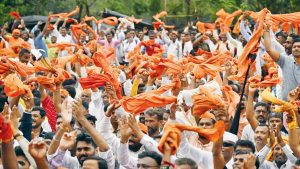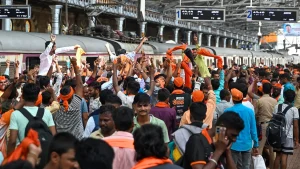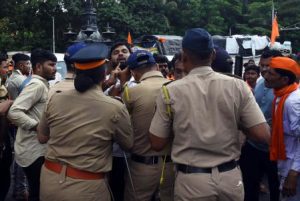Maharashtra– The ongoing Maratha quota protests in Mumbai have taken a serious turn as city police registered multiple cases against demonstrators across various locations. In a significant law enforcement action, 25 protesters were booked in Mumbai’s Bandra and Juhu areas during demonstrations demanding reservation benefits for the Maratha community. The charges against the protesters include unlawful assembly and obstructing public servants, highlighting the escalating tensions surrounding the reservation issue.
The Maratha quota protests have become a recurring theme in Maharashtra politics, with the community demanding inclusion in the Other Backwards Classes (OBC) category to access educational and employment reservations. These recent arrests underscore the challenges faced by both protesters seeking their constitutional rights and law enforcement agencies maintaining public order.
 Mumbai Police have registered nine cases against Maratha quota protesters across South Mumbai police stations, indicating the widespread nature of the demonstrations. The police action follows strict directives from the Bombay High Court, which ordered protesters to vacate the streets and directed the state government to take appropriate measures against violators of court orders.
Mumbai Police have registered nine cases against Maratha quota protesters across South Mumbai police stations, indicating the widespread nature of the demonstrations. The police action follows strict directives from the Bombay High Court, which ordered protesters to vacate the streets and directed the state government to take appropriate measures against violators of court orders.
The arrests in Bandra and Juhu areas represent just a fraction of the broader law enforcement response to the Maratha quota protests. Police officials have confirmed that charges of unlawful assembly and obstruction of public servants were filed against the 25 individuals, reflecting the authorities’ zero-tolerance approach toward activities deemed disruptive to public order.
Also READ: Maratha quota protests
Similar: NC slams Opposition and Manoj Jarange
Law enforcement agencies have been closely monitoring the situation, with Mumbai Police deploying over 2,000 additional personnel across the city and cancelling staff leaves to manage the ongoing demonstrations effectively.
The Bombay High Court’s intervention has significantly impacted the trajectory of the Maratha quota protests. The court issued urgent orders directing protesters to vacate the streets immediately and mandated the state government to take stringent action against anyone violating these directives. This judicial intervention came after concerns were raised about traffic disruptions and the impact on business activities in Mumbai’s commercial districts.
 The legal challenges surrounding the Maratha quota protests extend beyond immediate law and order concerns. The community’s demand for reservation under the OBC category has been a contentious issue, with various legal battles fought in courts over the years. The recent arrests in Bandra and Juhu highlight the intersection of legal rights, public order, and social justice movements.
The legal challenges surrounding the Maratha quota protests extend beyond immediate law and order concerns. The community’s demand for reservation under the OBC category has been a contentious issue, with various legal battles fought in courts over the years. The recent arrests in Bandra and Juhu highlight the intersection of legal rights, public order, and social justice movements.
The charges of unlawful assembly against the protesters reflect the delicate balance between constitutional rights to peaceful protest and maintaining public order. Legal experts suggest that while peaceful demonstration is a fundamental right, activities that disrupt public services or violate court orders fall under legitimate police action.
The Maratha quota protests have significantly impacted Mumbai’s business district, particularly in South Mumbai, which houses India’s top financial institutions and regulatory bodies. The demonstrations have caused traffic disruptions and affected normal business operations, prompting concerns from the commercial community.
The strategic locations chosen for the Maratha quota protests, including areas like Bandra and Juhu, demonstrate the community’s intent to maximise visibility for their demands. However, these locations also represent high-traffic zones where disruptions can have cascading effects on the city’s economy and daily life.
Business establishments have reported difficulties in normal operations due to the ongoing protests, while commuters have faced challenges in their daily travel. The police response, including the arrests in Bandra and Juhu, aims to restore normalcy while addressing the protesters’ concerns through appropriate channels.


However, recent incidents, including alleged violence at the Juhu depot involving BEST bus vandalism, have complicated the narrative around the peaceful nature of the demonstrations. Police registered cases against unidentified Maratha quota protesters for allegedly assaulting passengers and vandalising public transport, indicating that not all protest activities have remained within peaceful bounds.
The community leadership faces the challenge of maintaining discipline among protesters while advocating for their legitimate demands. The arrests in areas like Bandra and Juhu serve as a reminder of the consequences of crossing legal boundaries during demonstrations.
The Maharashtra government’s response to the Maratha quota protests has evolved from initial resistance to eventual dialogue. Recent developments suggest that the government has agreed to accord Kunbi status to Marathas, potentially addressing some of the community’s demands for reservation benefits.
The government has also committed to withdrawing pending police cases against Maratha quota protesters by September 2025, indicating a reconciliatory approach to resolving the ongoing dispute. This development could influence how future demonstrations are conducted and managed.


The Maratha quota protests and subsequent arrests highlight the complex dynamics between social justice movements and law enforcement in democratic societies. The booking of 25 protesters in Mumbai’s Bandra and Juhu areas for unlawful assembly and obstructing public servants reflects the challenges in balancing constitutional rights with public order maintenance.
As the Maratha community continues its struggle for reservation benefits, the recent arrests serve as a reminder that peaceful and lawful means of protest remain the most effective path toward achieving legitimate demands. The ongoing dialogue between community leaders, government officials, and judicial authorities will ultimately determine the resolution of this significant social and political issue affecting Maharashtra’s largest community.
The Maratha quota protests represent more than just a demand for reservations; they embody the aspirations of a community seeking recognition and equality within India’s democratic framework. The path forward requires continued engagement between all stakeholders while respecting legal boundaries and democratic institutions.

